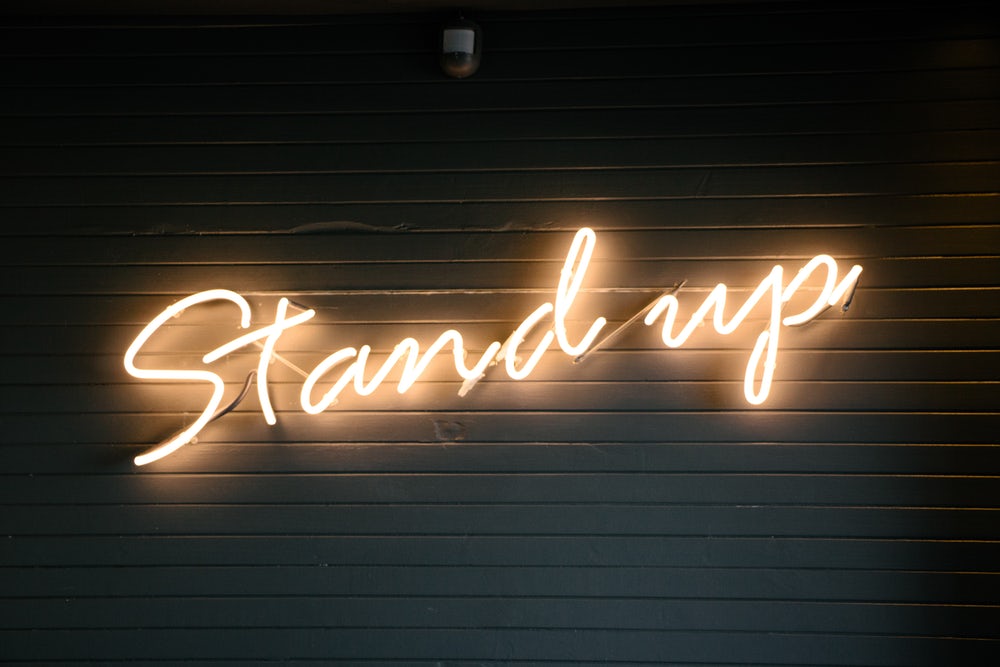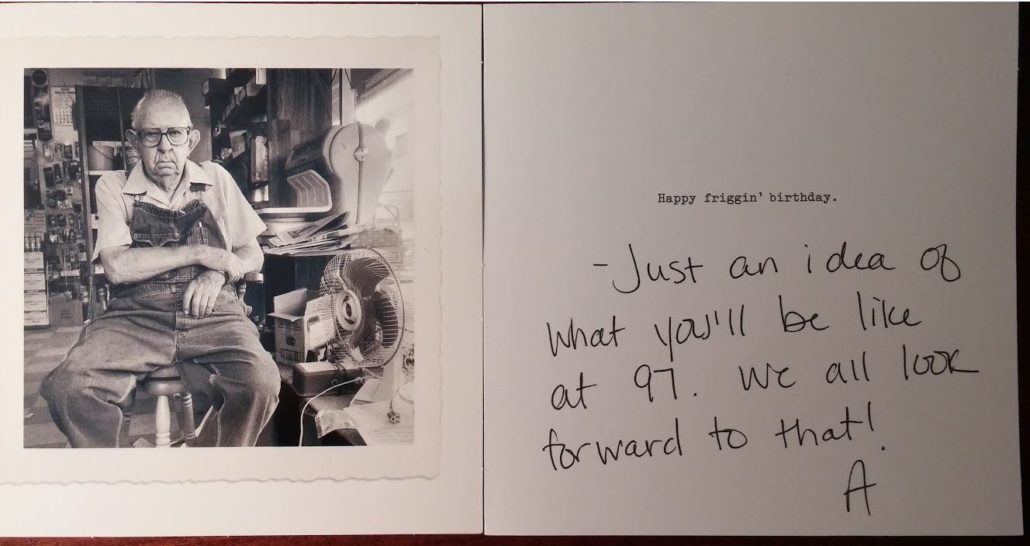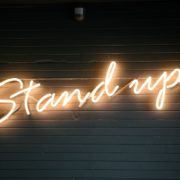OK, Old-timer. Do Your Part to Combat Ageism.

I suspect you caught what I just did with that headline. I appealed for help in combating ageism by committing it.
So easy to let words that are ageist slip off our tongues – like “old-timer.” We’ll use it to describe ourselves. We’ll casually, playfully tag friends with that monicker not realizing we are contributing to ageism.
It’s just one of a gazillion ways that we use words and phrases that prop up ageism. It’s almost as if using ageist words and phrases is an expected part of the “rite of passage” as we pass that 50-year threshold. Little do we realize how damaging it is, not only to the effort to eliminate ageism but also to our own self-esteem and, ultimately, to our aging process.
 Words count.
Words count.
Holly Lawrence, freelance writer, in an article “How Would We Live If We Forgot We Were Over 50” written for Next Avenue, quotes a 61-year old bank vice president who admits: “One thing I say that I should not say is ‘Oh yeah, a senior moment’ or ‘Forgive me, I’m an old man, so I forget these things.’ I say things like that and I know that some people may find it, you know, humorous. On the other hand, it does depreciate my value as a professional.”
Ashton Applewhite, acclaimed writer and activist, has stepped boldly into the breach in the battle against ageism. Her excellent book “This Chair Rocks: A Manifesto Against Ageism” takes it on and the prejudice and the damage it does. She refers to ageism as the last “-ism” that isn’t being addressed in our culture. Some have termed it the “last acceptable prejudice.”
Applewhite is not the only one that views this “-ism” as a problem. The World Health Organization (WHO) agrees. From their website, WHO offers up a couple of perspectives:
- Research suggests that ageism may now be even more pervasive than sexism and racism. This has serious consequences both for older people and society at large. For example, ageism limits the questions that are asked and the way problems are conceptualized and is hence a major barrier to developing good policies.
- Ageism has harmful effects on the health of older adults. Research by Levy et al shows that older adults with negative attitudes about aging may live 7.5 years less than those with positive attitudes.
- Socially ingrained ageism can become self-fulfilling by promoting in older people stereotypes of social isolation, physical and cognitive decline, lack of physical activity and economic burden.
My takeaway from these and other sources is that there are two major culprits in the proliferation and embedding of ageism: (1) ourselves and (2) people and organizations of influence who stand to gain by the continuation and deepening of the “-ism”.
The exploitation of the aging is a topic for another article but we need to look no further than the proliferation of advertising for “fix it” drugs and the latest senior-living iteration to realize that we are a big, naive and highly-exploitable market. But I digress
Each of us a big part of the problem.
Until I spent some time in Ashton Applewhite’s book, I hadn’t really considered how my own use of certain words or phrases are ageist and could subtly contribute to ageism. Maybe you hadn’t considered it either.
Think about how often you’ve used or heard these:
- I just had a senior moment.
- This aging thing is for the birds/is no picnic/sucks!
- What do you expect at your age? (If this comes from your doctor, change doctors!)
- You certainly don’t look your age.
- You’re not retired yet?
- When are you going to retire?
- How’s it going, gramps?
- Whaasup, old timer?
- “Young lady” when addressing an older woman
- Old dogs can’t learn new tricks.
- Can you believe she’s 60 years old?
- He is 80 going on 60.
- You shouldn’t be doing that.
- You could pass for much younger.
- Good to see you are still up and around.
- You’re still working?
- You have a smartphone?
Then we have jokes and birthday cards that contribute, thinking they are innocent and all in good fun. Here’s the card my daughter gave me for my 75th birthday (I got over it!)

You just think you are being funny!
Ever heard jokes like these?
“At four, success is not needing diapers. At 12, success is having friends. At 17, success is having a driver’s license. At 20, success is having sex. At 35, success is having money. At 50, success is having money. At 60, success is having sex. At 70, success is having a driver’s license. At 75, success is having friends. At 85, success is not needing diapers.”
“Grandma is so wrinkled she needs a bookmark to find her mouth.”
“My old Uncle Ed still whistles at girls but can’t remember why.”
Whether directed at myself or someone else, when I use this type of phraseology or jokes, I am practicing ageism, plain and simple. And I continue to engender its use in others.
William Sadler, in his excellent book ‘The Third Age: Six Principles for Personal Growth and Rejuvenation After Forty”, underscores the importance of tending to our own thoughts about aging:
“Our unwitting acceptance of negative stereotypes about age and growing older threatens the development of a rich, vital, creatively unfolding identity. This is why we should free ourselves from myths of aging well before it becomes irrevocably embedded in our neurons.”
“The stereotype of aging embedded in our neurons shapes our attitude and contributes to our decline and eventual placement in a nursing home where we spend a period of prolonged dying.”
Who would have thought that our own use of words could accelerate our trip to an “elder warehouse?”
Let’s start a revolution!
We can start our own individual campaign against ageism by being more attentive to the words we use which in turn help us turn the attitudes of our own aging more to the positive and away from the prevailing negative.
From Seniorliving.org, we find some thoughts on ways to wage your own battle against this entrenched discriminatory attitude:
- Give it back to them. If someone says “I’m glad you’re still up and around”, cordially respond, “I’m glad you’re still up and around too”. If a younger people ask you “Let us know if you need anything,” offer the same as well and say, “Let us know if you need anything too.”
- Flaunt your age when someone says you’re young. Be cheerful and say, “I earned my wrinkles,” or “I’m proud of my age,” or “You know I’m old and I like it.”
- What do you mean? If you encounter some complement –slash-awkward ageist comment, you can always ask them with a straight face and genuine puzzlement, “What do you mean?” This way, you wouldn’t be burdened to explain why the comment is ageist and offensive. It works all the time.
We have enough challenges in our fight against ageism without contributing to it with our own language and attitudes. Let’s start an anti-ageism revolution and clean up our own act. There are still societies where the elderly are venerated but it ain’t gonna happen in our culture. But we don’t need to deepen the offense.
How are you battling ageism? Have you experienced it? Scroll down and leave us your thoughts about this issue.





“At 60, success is having sex.” Well, I certainly wouldn’t turn down the sexagenarian “Al Swearengen” from the series Deadwood!